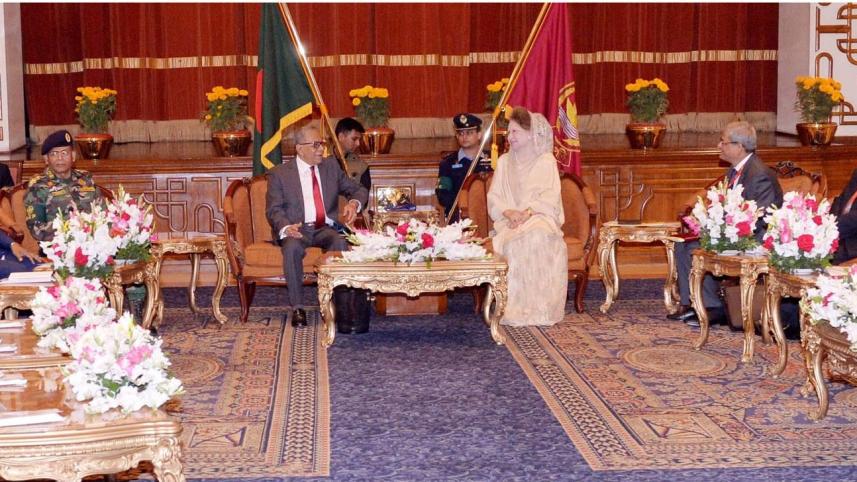BNP picks AL's pledge

There is a similarity between two arch-rivals Awami League and BNP in their preference for the formation of the Election Commission (EC). Khaleda Zia's present proposal for formation of the EC on the basis of consensus among political parties was a commitment of the ruling AL for the last eight years until last October.
In its manifesto, modified in national council in July 2009, the then ruling AL pledged to form the EC through political consensus. The promise remained in the AL's manifesto until it was amended dropping the pledge in the party's national council last October. However, the AL itself did not take steps according to its pledge to form the EC in 2012. Upon the advice of then Prime Minister Sheikh Hasina, then President Zillur Rahman initiated talks with political parties in December 2011 seeking their opinion on the formation of the EC.
The president's move could not forge a consensus among political parties. The then political situation became volatile after the cancellation of the election time non-partisan caretaker government (CG). The BNP-led alliance was agitating for restoration of the CG system. In a show of positive gesture, they joined the talks with the president. But BNP and its components of the alliance showed a lack of interest in the formation of the EC. They focused on their main agenda and urged the president to take steps for restoration of the CG.
As many as 23 political parities including AL and BNP joined the talks. Of them, 13 political parties, including the BNP, strongly proposed a restoration of a CG although it was not on the agenda. Six parties, including the AL and Jatiya Party, opposed the CG system either at the dialogue or outside. Two of the remaining four parties that did not say anything on this issue had earlier spoken in favour of the caretaker system. Wrapping up the talks with the political parties, then President Zillur Rahman formed a four-member search committee to propose names for formation of the EC. The present EC led by Kazi Rakibuddin Ahmad was formed in February 2012.
This time around, the situation is different. The BNP-led alliance is not agitating on the streets demanding restoration of the CG. Khaleda Zia herself in November came up with a set of electoral reform proposals focusing on the formation of the new EC in February next year on the basis of consensus among the political parties. Her party requested President Abdul Hamid to hold talks with the political parties to form an EC acceptable to all through a search committee. The president responded to the proposal and began holding discussions with the BNP on Sunday. He will sit separately with other political parties including the AL.
Khaleda Zia proposed names of some eminent persons for the search committee. This shows BNP's change of heart. The party seems to have taken a realistic approach in the context of the prevailing political situation. Its demand for restoration of the non-partisan CG system will no way be accepted by the ruling AL. A strong EC is needed for the next election to be conducted in a free and fair manner in the absence of the CG.
The dialogue led by the president seems to have offered an opportunity to bring a qualitative change in the confrontational culture of politics. Politics returned to the discussion table after a long time. Formation of a new EC through consensus among the political parties will be a groundbreaking development. And this seems possible as the BNP now wants what the ruling AL committed to earlier.
The success of the president's move may pave the way to bring fresh reform in laws to strengthen the EC and the electoral system. If so, this may help the ruling AL to fulfill its own pledge made in the run up to the January 2014 parliamentary election in which the party made the same promises.
If the EC is strengthened and successful in holding free and fair elections, it may bury the demand for an unelected election-time government. Otherwise, the demand will remain valid.
The writer is Special Correspondent, The Daily Star.




 For all latest news, follow The Daily Star's Google News channel.
For all latest news, follow The Daily Star's Google News channel.
Comments